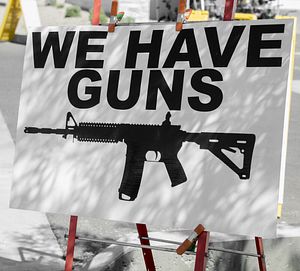A former Australian politician known for his anti-gun stance suggests the Department of Foreign Affairs and Trade should update its travel warning, and warn Australians against travel to California. He also questions the overall usefulness of the Australia-U.S. alliance.
However Tim Fisher is no Greens supporter nor is he even on the left. He was Deputy Prime Minister throughout the era of Australian conservative icon John Howard and leader of the Nationals, the conservative rural party that often rules in Coalition with the Liberal Party. Howard always made Australia’s alliance with the U.S. a central part of his foreign policy. However after the Port Arthur massacre of early 1996 that killed 35 people both Fisher and Howard went on an anti-gun drive, buying back over 650,000 guns. It’s a well reported fact, but there has been no gun massacre in Australia since. Though possibly an increase in “sternly worded letters.”
John Howard remains well-respected on both sides of Australian politics for his decisive action on the issue. Fisher faced strong criticism from his own rural constituents, an effigy of him was hanged in one Queensland town.
However what might be notable is that this, “what’s America done for us lately, anyway?” question is never far away and has rather frequently been uttered by conservatives traditionally far more friendly to U.S. interests than the left is.
According to Fisher, “It’s time to call out the USA… I’m a bit sick and tired of the U.S. chucking handballs at us, putting into their travel advice that it’s not safe to go to Sydney” after the Paris attacks. Fisher went on to say the alliance had been “too much one way.” He also said the U.S. “is not stepping up on the public policy reform front” and the NRA had too much power.
Prime Minister Malcolm Turnbull has made similar noises regarding the alliance in the past. However much of it has been limited to rhetoric at this early point in his time in office and he was as chuffed, if confused, as any to be personally invited to Washington by Obama.
Another Malcolm fretted over what he saw as a dangerous alliance, writing a book on it in 2014, not long before he died. That was. of course, Malcolm Fraser, the former prime minister, who believed Australia needed to be far more skeptical of following the U.S. and more independent as a nation. That was also a pillar of policy of his newly formed party Renew Australia, which wanted to see a non-aligned Australia more deeply engaged in its region and with Asia.
None of this exactly adds up to a groundswell or sea change, but there have been a few questions about the alliance raised by Australian conservatives in recent years, even as those on the right side of the Labor Party, like leader Bill Shorten, continue to put the U.S. front and center. The rise of China always raises questions for Australia on the issue of how to “balance” everything but as Fisher has pointed out, there are issues outside of Australia being caught between two large powers. Does Australia want as a best friend a nation that issues travel warnings against it whilst refusing to look at what more and more (including the president) believe would be a very good example when it comes to reducing shooting deaths?

































